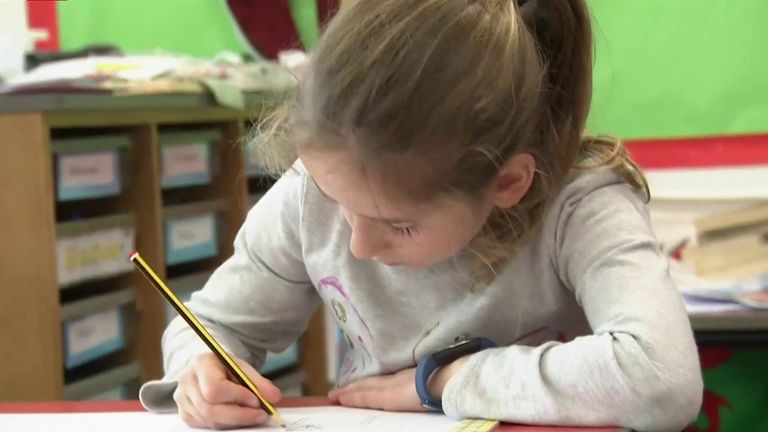Coronavirus: No child known to have passed COVID-19 to adults, global study finds
The review found children have much less severe symptoms and often do not have any at all.
Thursday 30 April 2020 23:01, UK
No child is known to have passed COVID-19 on to an adult, a review of evidence from around the world has found.
The review into paediatric coronavirus studies found it is likely children "do not play a significant role" in transmitting the coronavirus and are significantly less likely to become infected than adults.
It also found there has not been a single case of a child under 10 transmitting COVID-19, even through contact tracing carried out by the World Health Organisation (WHO).
Collated by paediatric blog Don't Forget The Bubbles, in partnership with the Royal College of Paediatrics and Child Health (RCPCH), researchers looked at 78 studies from around the world, with most from China where the disease originated.
The findings come as the Swiss government said grandparents are now allowed to hug their grandchildren because they concluded that "young children don't transmit the virus".
Led by Alasdair Munro, a clinical research fellow in paediatric infectious diseases, the new study concluded: "COVID-19 appears to affect children less often, and with less severity, including frequent asymptomatic or subclinical infection.
"There is evidence of critical illness, but it is rare. The role of children in transmission is unclear, but it seems likely they do not play a significant role."
They used an example of a nine-year-old boy in the French Alps who tested positive, with symptoms.
Despite attending three schools during this time, exposing 112 different people, the child did not transmit COVID-19 to anybody else.
Professor Russell Viner, president of the RCPCH, told the Daily Telegraph: "From around the world, we are not seeing evidence that children are involved in spreading or transmitting the virus, but we do not have enough evidence."
He added that it was too soon to say children could hug their grandparents.
The review also found that looking at both confirmed and suspected cases of COVID-19 in children aged six to 10, 32% were asymptomatic.
When children did have symptoms they tended to be "more mild", with the most common features a cough and fever, followed by upper respiratory tract symptoms such as a runny nose and sore throat.
About 10% had diarrhoea and/or vomiting, with some only having those symptoms.
The researchers found that children were "significantly less affected" than adults, with only 0.6% of younger children diagnosed with the disease having become critically ill.
They added: "To date, deaths remain extremely rare in children from COVID-19, with only a handful of reported cases."
:: Listen to the Daily podcast on Apple Podcasts, Google Podcasts, Spotify, Spreaker
When it comes to newborns, the review looked at the nearly 50 cases reported and said the majority of newborns whose mothers have tested positive for COVID-19 have not contracted it.
Of the few cases of newborns testing positive - one at 36 hours of age - none have suffered any complications and needed minimal respiratory support, it added.






